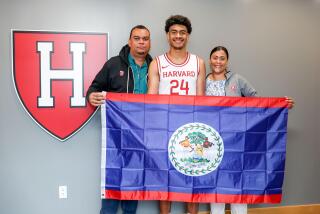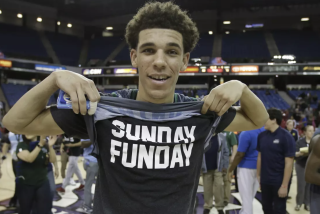Love of Game Keeps Chip on Move : Ex-Palisades Star Has Summer Job in Canada With WBL
- Share via
When Chip Engelland was playing basketball at Palisades High School in the late 1970s, no one thought that “The Boys of Summer” might make a good title for a basketball book.
Nor that Engelland would one day be one of the boys.
Roger Kahn wrote his book of that title about men who had played baseball with the Brooklyn Dodgers when the national pastime was just about the only summer game that mattered.
But since the Dodgers left Brooklyn, other sports have tried to become summer games.
The U.S. Football League tried but failed to take hold in the season usually reserved for baseball, and plans have been announced for a new spring football league called America’s Football Teams, which would vie with baseball for customers.
The National Basketball Assn. made its first incursion into summer this year when the Lakers won the league title on June 21. Now the World Basketball League, which has franchises in such cities as Fresno, Las Vegas, Chicago and Vancouver, has made its debut with a schedule that runs from the middle of May into September.
Engelland, who graduated from Duke University in 1983 after four years as a varsity cager, is playing in the WBL. He may be on the last leg of a professional basketball odyssey that has taken him from the Philippines to Kansas and this summer to Canada, where he is the first guard off the bench for the Calgary 88s.
Why is a Duke graduate, a bright young man who received his degree in four years, playing pro ball in a new league for players 6 foot, 5 inches and shorter?
For one thing, Engelland said in a telephone interview, he is being paid about $20,000 for the WBL’s four-month season, “not bad at all for a summer job.”
“Right now I’m just looking to have good basketball experiences,” he said. He explained that in the last two years he had played point guard, the game’s ball-handling and play-making position, for the Topeka Sizzlers of the Continental Basketball Assn. and that before that he had played off-guard, primarily a position for a scorer.
He said that playing point guard “was very difficult” because he was up against players “who were quicker and better ball handlers.” But he added that playing in the CBA was still “a tremendous experience. My goal in basketball is to keep learning and improving, and the fun comes with that.”
Playing basketball in the Philippines from 1983 through 1985, he said, “was a tremendous cultural and basketball experience,” even when civil disruption was rampant in Manila, where he played for a team backed by the San Miguel brewery.
Cockfighting and boxing may come first, he said, but basketball is very popular in the Philippines. “The crowds were 100% basketball enthusiasts. Every game was televised, and we had very high exposure because we played every Tuesday, Thursday and Sunday.”
In his first year in Manila, he said, his team played in the 30,000-seat Aranata Coliseum, where heavyweights Muhammad Ali and Joe Frazier fought the match which became known as “The Thrilla in Manila.” In his other two years there, the team played “in a state-of-the-art gym,” he added.
He played with two other Americans on that team, Jeff Moore and Dennis Still, who both played for Loyola Marymount. Financially, Engelland said, “we were well taken care of. Once you left the United States, you had no expenses; they were taken care of for you. I lived in a nice condominium that was rented out as an apartment.”
Living in the same complex with Engelland was Ricardo Brown, who was born in the Philippines and was a star guard at Pepperdine in 1979 and 1980. He said that Brown is a pro basketball star in his homeland, “a household name.”
Though there is great poverty and civil unrest in the Philippines, he said he thinks that basketball acts as an escape valve for many Filipinos in much the same way that baseball lifted the spirits of Americans during the Depression.
There was turmoil in Manila, he said, but little danger “unless you got caught on the wrong street at the wrong time. I never felt unsafe. There were a lot of political rallies and activism, but I was never involved in any life-threatening situations--or even close.
“That’s why basketball is good for that country. It gives the people a great feeling of unity. They have equivalents of our Julius Erving (the recently retired NBA star), and the game gives people a feeling of identity.
“There are hoops everywhere; you see them on telephone poles and walls--everywhere. The Filipinos love basketball.”
They apparently loved Engelland too, partly because he averaged about 30 points a game as an off-guard and partly because his team won all but one of the international tournaments in which it competed and about three-fourths of their league games in Manila.
The San Miguel team broke up after the 1985 season, and Engelland came home and caught on with the Topeka Sizzlers. The CBA, he said, has improved conditions for players a great deal in recent years. “I wasn’t showcased by any means,” he said, but he made about $500 a week.
He signed with Calgary this year after he was one of five players from universities in North Carolina taken by the 88s in the WBL’s territorial draft. With the 88s, he has resumed his scoring role and is averaging about 15 points a game while coming off the bench.
He said that Calgary plays “a quickly-paced game, I’ll tell you. We try to push it up the floor as fast as we can and get a good shot as quickly as possible. I prefer the fast pace. I like to run because more shots are taken, and it’s more fun for the players and the fans.”
His teammates include point guard Sidney Lowe, who was on the 1983 NCAA champion North Carolina State team and the Indiana Pacers of the NBA; guard James Thomas, who played with Isaiah Thomas on Indiana’s 1981 NCAA champions and also with the Pacers and the Los Angeles Clippers, and forward Carlos Clark of the University of Mississippi, who was with the Boston Celtics for two seasons and also played in the CBA.
“It’s a good collection of guys with winning backgrounds. It’s fun to pool everyone’s knowledge and try to formulate a winner.”
Pro basketball hasn’t been everything he had hoped for. He wasn’t drafted by an NBA team after his senior year, and he would have had a tough time trying to play in Europe, where there are quotas on U.S. players and the tall men command high salaries--not 6-3 guards.
The more glamorous and better paying professional leagues have never even flirted with Engelland, but he still loves the game.
“Even in the CBA (where he had problems playing at an unfamiliar position) it was a tremendous experience. I’ve been real lucky. At Duke I met some great people.
“It could always be better. There is always some adversity and hardship, and I haven’t had the dream career with everything falling into place. But it’s been great, and there are very few basketball jobs available.”
He said he plans to play a couple of more seasons and then hopes to attend law school, possibly at Duke.
If basketball has not always returned his love, he said, he has still had a good time and has played against some of the game’s greatest players at all levels. He said that it was a treat to be on the same court with the many stars from Crenshaw High School, with James Worthy and Michael Jordan when they played at North Carolina or with NBA players in summer leagues.
“I think I love it now almost as much as I did as a kid.”
More to Read
Go beyond the scoreboard
Get the latest on L.A.'s teams in the daily Sports Report newsletter.
You may occasionally receive promotional content from the Los Angeles Times.










